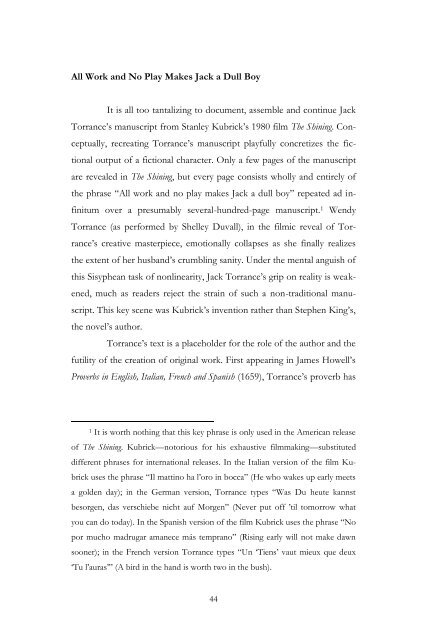CONTACT WITH POETS
Ev4Qw3
Ev4Qw3
Create successful ePaper yourself
Turn your PDF publications into a flip-book with our unique Google optimized e-Paper software.
All Work and No Play Makes Jack a Dull Boy<br />
It is all too tantalizing to document, assemble and continue Jack<br />
Torrance’s manuscript from Stanley Kubrick’s 1980 film The Shining. Conceptually,<br />
recreating Torrance’s manuscript playfully concretizes the fictional<br />
output of a fictional character. Only a few pages of the manuscript<br />
are revealed in The Shining, but every page consists wholly and entirely of<br />
the phrase “All work and no play makes Jack a dull boy” repeated ad infinitum<br />
over a presumably several-hundred-page manuscript. 1 Wendy<br />
Torrance (as performed by Shelley Duvall), in the filmic reveal of Torrance’s<br />
creative masterpiece, emotionally collapses as she finally realizes<br />
the extent of her husband’s crumbling sanity. Under the mental anguish of<br />
this Sisyphean task of nonlinearity, Jack Torrance’s grip on reality is weakened,<br />
much as readers reject the strain of such a non-traditional manuscript.<br />
This key scene was Kubrick’s invention rather than Stephen King’s,<br />
the novel’s author.<br />
Torrance’s text is a placeholder for the role of the author and the<br />
futility of the creation of original work. First appearing in James Howell’s<br />
Proverbs in English, Italian, French and Spanish (1659), Torrance’s proverb has<br />
1 It is worth nothing that this key phrase is only used in the American release<br />
of The Shining. Kubrick—notorious for his exhaustive filmmaking—substituted<br />
different phrases for international releases. In the Italian version of the film Kubrick<br />
uses the phrase “Il mattino ha l’oro in bocca” (He who wakes up early meets<br />
a golden day); in the German version, Torrance types “Was Du heute kannst<br />
besorgen, das verschiebe nicht auf Morgen” (Never put off ’til tomorrow what<br />
you can do today). In the Spanish version of the film Kubrick uses the phrase “No<br />
por mucho madrugar amanece más temprano” (Rising early will not make dawn<br />
sooner); in the French version Torrance types “Un ‘Tiens’ vaut mieux que deux<br />
‘Tu l’auras’” (A bird in the hand is worth two in the bush).<br />
44


